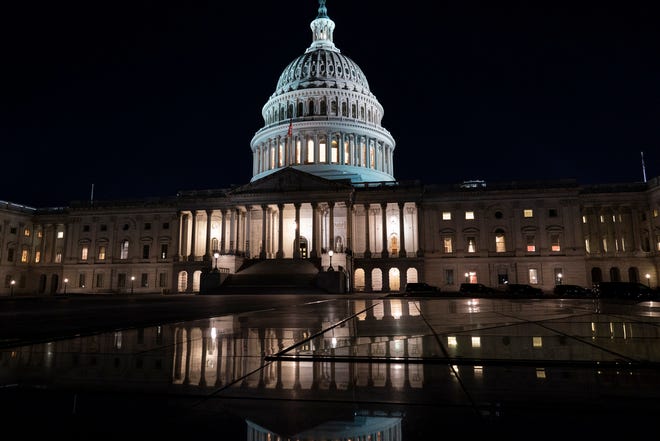
WASHINGTON – The Democratic-controlled Senate Saturday overcame Republican roadblocks and a debate that lasted beyond 24 hours to pass President Joe Biden's $1.9 trillion COVID-19 relief package which would provide millions of Americans with $1,400 direct payments, billions of dollars for vaccine distribution, and funds to help reopen schools and colleges.
The chamber passed the bill following a session that began around 9 a.m. Friday and ended at approximately 12:30 p.m. on Saturday, aft a "vote-a-rama" of proposed changes from both parties. The final vote was 50-49 with all Republicans voting against the measure and all members of the Senate Democratic caucus supporting it. Sen. Dan Sullivan, R-Alaska, was not present for the vote.
"It’s been a long day, a long night, a long year, But a new day has come," Senate Majority Leader Chuck Schumer said. “We tell the American people 'help is on the way.'"
Senate Minority Leader Mitch McConnell, R-Ky., countered that "the Senate has never spent $2 trillion in a more haphazard way or through a less rigorous process."
The bill has been Biden's chief legislative priority as he begins his presidency. He's stressed the aid is sorely needed for Americans battling the economic impacts of a pandemic that's killed more than 522,000 Americans and has pushed for Congress to pass the bill quickly.
In brief remarks Saturday morning, the president told reporters the package was "one more giant step forward" on delivering on his pledge to deliver aid to millions of Americans suffering from the effects of the COVID-19 pandemic.
"The bottom line is this: this plan puts us on a path to beating this virus," he said.
Democrats did not get everything they wanted. The bill does not include a $15 federal hourly minimum wage that progressives had sought. And weekly unemployment benefits were pared back from $400 to $300. But it includes $350 billion for states and localities, provides economic assistance to renters and expands the child tax credit.
Republicans have decried the measure as bloated legislation that disproportionately benefits blue states and large cities with assistance that has nothing to do with the pandemic.

The Democratic-controlled House, which approved a version of the bill last week, must pass the bill one last time before Biden can sign it because of the changes the Senate made.
But those tweaks – notably the lack of a $15 minimum wage and a reduction in unemployment benefits – could make it more difficult for some House Democrats to support the measure and imperil passage in the chamber.
Two Democrats from the party’s conservative wing had voted against the bill the first time it passed the House. Progressives had united around the bill at the time, but some seemed to waver in their support for the revised bill.
Rep. Bonnie Watson Coleman, D-N.J., said she was wondering whether she could still support the bill with the Senate’s changes.
"What are we doing here? I'm frankly disgusted with some of my colleagues and question whether I can support this bill," she wrote in a tweet.
But Democrats are under a time crunch. They want the bill to become law by mid-March, when a federal boost to unemployment benefits expires. House Democrats have signaled they could vote soon after the Senate finished with the bill. House Majority Leader Steny Hoyer, D-Md., said the House would likely vote on the bill on Monday.
The bill's partisan vote is different from other COVID stimulus plans passed since the pandemic took hold about a year ago. Five other packages passed with support from both parties last year when control of Congress was split between the two parties.
Senate Majority Leader Chuck Schumer, D-N.Y., acknowledged the lack of Republican support, saying Friday "It would be so much better if we could in a bipartisan way, but we need to get it done."
Republicans objected to the size of the legislation and derided it as full of provisions not related to COVID relief, but they ultimately did not have the votes to block the legislation.
Senate Minority Leader Mitch McConnell denounced it as an "ideological spending spree with non-related COVID policies."
Other Republicans questioned the need for more aid as vaccines rolled out and the economy showed signs of improvement.
"Things are looking better," said Sen. Lindsey Graham, R-S.C., who asked if there were ways to "slow down" before spending so much money. Graham argued the $350 billion in state and local funding would go to "blue states" because of the funding formula used in the latest round of relief.
Among the bill's provisions:
- Provides most Americans earning up to $75,000 a $1,400 stimulus check.
- Extends a $300 weekly federal boost to unemployment benefits through August
- Sends $350 billion to state and local governments whose revenue has declined because of COVID-19's impact on the economy.
- Allocates $130 billion to help fully reopen schools and colleges.
- Allots $30 billion to help renters and landlords weather economic losses.
- Devotes $50 billion for small-business assistance.
- Dedicates $160 billion for vaccine development, distribution and related needs.
- Expands the child tax credit up to $3,600 per child.
More:Republican Sen. Ron Johnson forces Senate to read all 628 pages of Biden's COVID bill aloud
The Senate went through a lengthy process known as a "vote-a-rama" prior to the final vote to propose changes to the bill.
Sen. Bernie Sanders, I-Vt., tried to introduce an amendment increasing the federal minimum wage to $15 an hour, but it failed after a group of Democrats joined Republicans in quashing it. House Democrats had included the wage hike in their version of the bill, but a key Senate official ruled the increase could not stay in the final Senate bill.
Sanders, in a statement, said this was not the last time he would try to bring up the wage hike for a vote.
"If any senator believes this is the last time they will cast a vote on whether or not to give a raise to 32 million Americans, they are sorely mistaken. We’re going to keep bringing it up, and we’re going to get it done because it is what the American people demand and need," he said.
The Senate's final passage of the bill came after Senate Republicans threw up procedural roadblocks to try to delay it. Sen. Ron Johnson, R-Wisc., had forced the Senate to read the over 600-page bill out loud on Thursday, a process which ultimately took nearly 11 hours and did not finish until early in the morning.
A further delay occurred Friday afternoon as senators were gridlocked over changes to the bill's unemployment provisions. A compromise agreed to after hours of deliberation among Democratic senators extended unemployment benefits through the end of August at $300 per week, with the first $10,200 of unemployment benefits non-taxable for households with incomes under $150,000.
"This bill that we are completing now is the most significant piece of legislation to benefit working people in the modern history of this country," Sen Bernie Sanders, I-Vt., said before the Senate passed the bill. "The people are hurting and today, we respond."
Schumer brushed aside concerns about delaying aid over the impasse on unemployment benefits. The 8-hour debate over unemployment was "meaningless compared to the relief American people get," he said Saturday morning following the bill's passage.
More:Republican Sen. Ron Johnson forces Senate to read all 628 pages of Biden's COVID bill aloud








